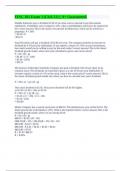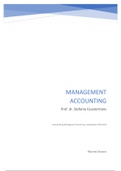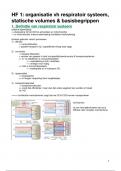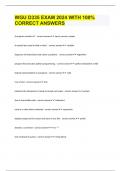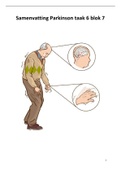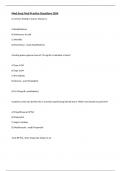1. L’estrange v Graucob (1934)
Principal of the case and why it is under contract law : because she had signed the
agreement, even though she had not read it, was deemed to have read it, and was
therefore bound as a result. The whole point of contracts is that they are meant to be
BOUND. L’estrange v Graucob is a leading judicial precedent here to help understand
contracts. This judicial precedent says that when you sign an agreement you're bound to
it. You have to abide by everything that’s in that agreement.
Summary: In brief, L’estrange wanted to buy a vending machine for her café that sold
cigarettes, Graucob was selling the vending machine and she signed a contract stating
she is buying the vending machine. The vending machine turned out to be faulty so she
called Graucob demanding a refund or replacement. He said that in contract there was
an agreement that she is now bound to since she signed it stating “any express or
implied condition statement or warranty, statutory or otherwise, not stated herein is
hereby executed.” Basically, it means any problems relating to its machine, is now not
their problem and not their responsibility. She went to court to fight him and the judge
sided with Graucob stating “if you have signed an agreement the law will deem you to
have read every term”. Hence she loses the case.
Invitation to treat vs offer and unilateral contracts:
2. Pharmaceutical Society of GB v Boots Cash Chemist (Southern) Ltd [1953]
Principal : The question was whether the contract of sale was concluded when the
customer selected the product from the shelves (in which case the defendant was in
breach of the Act due to the lack of supervision at this point) or when the items were paid
for (in which case there was no breach due to the presence of the pharmacist at the till).
Summary: The defendant ran a self-service shop which sold non-prescription drugs and
medicines. These items were displayed in open shelves from which they could be
selected by the customer, placed in a shopping basket, and taken to the till where they
would be paid for. The till was operated by a registered pharmacist. However, the
claimant brought proceedings against the defendant for breach of section 18(1) of the
Pharmacy and Poisons Act 1933, which requires the supervision of a registered
pharmacist for the sale of any item in the Poisons List.The Court of Appeal held that
the defendant was not in breach of the Act, as the contract was completed on
payment under the supervision of the pharmacist. The display of the goods on the
shelves was not an offer which was accepted when the customer selected the
item; rather, the proper construction was that the customer made an offer to the
cashier upon arriving at the till, which was accepted when payment was taken.
, This analysis was supported by the fact that the customer would have been free to
return any of the items to the shelves before a payment had been made.
3. Moran v University College Salford (No.2) [1993]
4. Partridge v Crittenden [1968]
Principal: In Partridge v Crittenden it was an offence to ‘offer for sale’ these birds under
the Protection of Birds Act 1954 but the advertisement was not an ‘offer’ therefore there
was no contravention of the Act. The issue on appeal was whether the advertisement
was properly construed as an offer of sale (in which case the defendant was guilty) or an
invitation to treat (in which case he had committed no offence). A further issue was
whether it was appropriate to adopt a different interpretation of the phrase ‘offer for sale’
in the context of criminal law than was accepted in the context of contract law.
Summary: The defendant advertised for sale a number of Bramblefinch cocks and hens,
stating that the price was to be 25 shillings for each. Under the Protection of Birds Act
1954, it was unlawful to offer for sale any wild live bird. The Royal Society for the
Prevention of Cruelty to Animals (RSPCA) brought a prosecution against the defendant
under the Act. At his trial, the defendant was found guilty of the offence by the
magistrates; he appealed this conviction. The court held that the advertisement was
not an offer but an invitation to treat, and as such the defendant was not guilty.
The court also rejected the suggestion that the court should adopt a stricter
interpretation of the phrase ‘offer for sale’ in the criminal context compared to the
contractual context, reasoning that to do so would usurp the legislative function.
The legislature had chosen the phrase ‘offer for sale’ based on its existing
understanding, and to alter this understanding under the pretext of ‘interpretation’
was not the proper role of the court.
5. Carlill v Carbolic Smoke Ball Co [1893] - this is a unilateral contract
Principal: In Carlill v Carbolic Smoke Ball Co – the words contained in the offer were
sufficiently clear enough, to be capable of acceptance. With unilateral offers – offers
often require performance for acceptance, but this must be performed in full. The main
issue was whether the advert in question constituted an offer or an invitation to treat.
Summary: The defendant, the Carbolic Smoke Ball Company, placed an advertisement
in a newspaper for their products, stating that any person who purchased and used their
product but still contracted influenza despite properly following the instructions would be
entitled to a £100 reward. The advert further stated that the company had demonstrated
its sincerity by placing £1000 in a bank account to act as the reward. The claimant, Mrs

